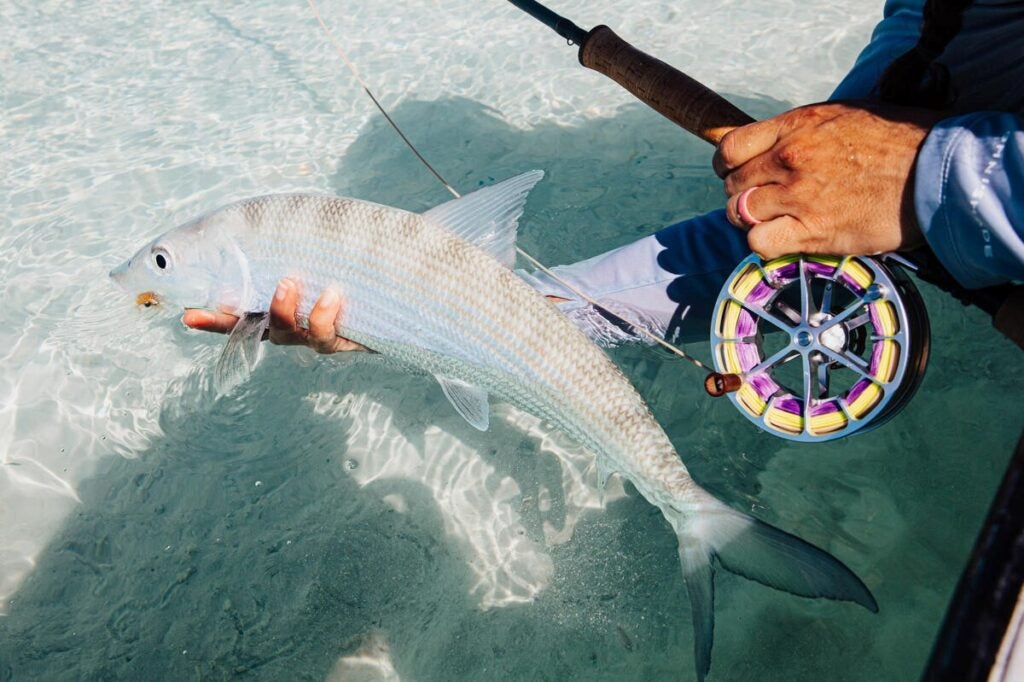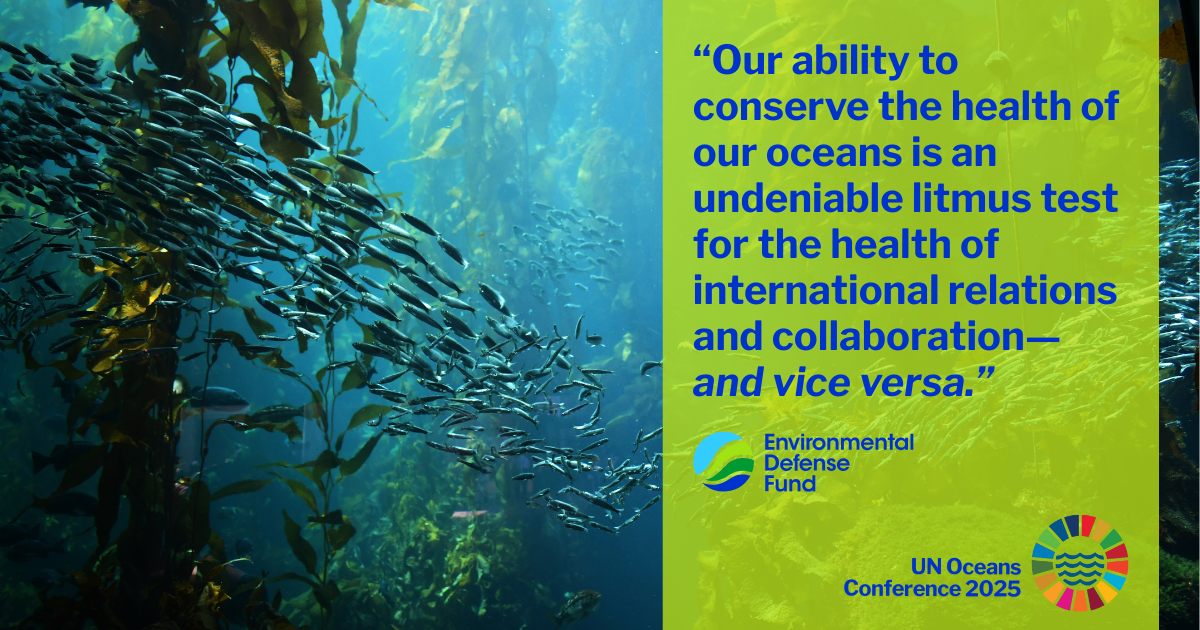Guiding The Bahamas to a Brighter Future

By Ann M. Albury, Sepp Haukebo, and Carlito Turner
The cerulean blue waters of The Bahamas are world renowned for their expansive saltwater fishing flats. These flats—shallow, sand or seagrass covered nearshore areas—are the ideal habitat for stalking prized fly fishing species, including bonefish, tarpon, permit, cobia, and snook.
The Bahamas is known as one of the top destinations globally for saltwater flats fishing. According to research by The Bahamas Sportfishing Conservation Association, The Bahamas is home to the largest flats and bonefish population on the planet. This is why each year, tens of thousands of recreational anglers from around the globe travel to The Bahamas, often referred to as the “bonefish capital of the world”, in search of the catch of a lifetime. Success is not guaranteed—bonefish are notoriously shy and elusive, meaning landing a bonefish is a formidable challenge for even the most experienced anglers.
Fortunately, The Bahamas is also home to local professional fly fishing guides that make their living teaching casting techniques, sharing their observations of fish behavior, and a lifetime of knowledge of local waterways and ecosystems, to help seasoned and novice anglers land the catch of their dreams.

Fishing Guides: Honored Teachers and Protectors of the Flats
Flats fishing guides spend countless hours on the water observing local flora and fauna. They are also some of the first to witness emerging environmental threats, including illegal sand and limestone mining, unauthorized coastal development, mangrove deforestation, and the impacts of climate change on fisheries.
With an intimate awareness of The Bahamas and the critical flats, coral reef, and mangrove ecosystems that support both recreational fisheries and local small-scale fisheries, guides are also some of the staunchest advocates for the protection and management of the marine environment. In recognition of this, recently, the Honorable Minister Vaughn Miller of the Ministry of Environment and Natural Resources appointed 12 veteran guides as wardens for the first time ever.
For guides, playing this critical role is nothing new. For decades, guides have served as unofficial ambassadors for The Bahamas, welcoming avid anglers from around the globe and teaching them about Bahamian history and culture, while also serving their own communities as local leaders, fighting for civil rights, supporting local employment, and acting as conservation stewards.
The recreational flats fishing sector generates an estimated $182 million dollars each year for the nation and supports 8,389 full-time jobs. In particular, throughout the less-populated “family islands” of The Bahamas, fishing lodges and local guiding businesses are one of the highest revenue generators for local economies.
Despite their importance to Bahamian communities and coastal ecosystems, local guides face many challenges, including climate change, coastal habitat destruction, and access to affordable loans and insurance.
Homecoming: A Bridge Between Islands
As the scale and scope of threats to the flats increase, opportunities to discuss and develop strategies to address these challenges are few and far between. In September 2024, over 70 flats fishing guides from more than a dozen islands, with over 1,500 years of cumulative guiding experience, met in The Bahamas’ capital city of Nassau for the Second Bahamas National Flats Fishing Guide Homecoming Conclave. The event was organized by The Bahamas Sportfishing Conservation Association, The Bahamas Fly Fishing Industry Association, Environmental Defense Fund, and Russell Craig & Associates.
In The Bahamas, a “homecoming” signifies when a former island resident returns home to reunite with friends and family. The Second Bahamas National Flats Fishing Guide Homecoming Conclave paid homage to this concept but offered something unique—an opportunity for flats guides from across the country to meet in-person and deepen relationships with each other. In an archipelagic country with over 700 islands and 2,300 cays, the opportunity to meet guides from other islands of The Bahamas can be rare as interisland travel is costly. The homecoming served as an opportunity to forge new relationships and strengthen camaraderie and the collective guide community.
Guides weren’t the only participants at the homecoming. The opening ceremony also served as an opportunity for guides to hear from and address Bahamian dignitaries and policymakers.
In his keynote speech at the event, Prime Minister of The Commonwealth of The Bahamas, the Honorable Philip Davis addressed the guides and voiced his appreciation for their role as cultural ambassadors and environmental stewards, noting, “flats fishing is a Bahamian cultural legacy that stretches back over a century. You hold the wisdom of generations—an impressive stock of skills and techniques that take years to hone, and decades to master. And even as you share these talents with others, you do so with a profound respect and appreciation for our marine ecosystems.”

At the opening ceremony, the Prime Minister was joined by Honorable I. Chester Cooper, Deputy Prime Minister and Minister of Tourism, Investments and Aviation, Honorable Jomo Campbell, Minister of Agriculture and Marine Resources and Member of Parliament representing Centreville, Honorable Leon Lundy, Minister of State and Member of Parliament representing The Berry Islands, Mangrove Cay and South Andros, and Honorable Leonardo Lightbourne, Member of Parliament representing North Andros. During the opening ceremony, two veteran fly fishing guides, Omeko Glinton from Grand Bahama and Stevie McKenzie from Exuma addressed the delegation and advocated for greater government support for the industry and policy interventions to protect the livelihoods of Bahamian guides.
Over the remainder of the two-day event, participants shared their perspectives on challenges and opportunities to sustainably improve the Bahamian recreational fisheries sector, and guides coalesced around regional priorities for securing the future of the sector.
During the closing ceremony, Minister Miller recognized the wealth of knowledge that guides hold and expressed his support for expanding the warden program throughout additional islands of The Bahamas, formally entrusting veteran guides as stewards of the ecosystems that they have protected for decades.
The Homecoming marked a pivotal moment for the Bahamian flats guiding industry. It was an opportunity to bring guides together to celebrate a rich history of saltwater fly fishing, and together, to chart a path for the future. The event embodied a common hope across all participants—that the natural resources of The Bahamas and the Bahamian communities that rely on them prosper, supported by a healthy and thriving local guide sector.
As Prime Minister Davis noted in his keynote address, “a sustainable flats fishing industry involves community empowerment as much as it involves environmental conservation.” The task now is to build from the momentum of the Homecoming to ensure that Bahamian guides receive the support they need to continue their path as stewards of the environment and leaders in their communities.













